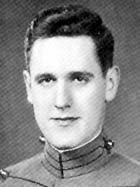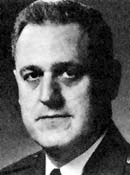Courtesy of his classmates,United States Military Academy:
James Creelman Huntley
No. 13412 • 23 October 1920 – 13 August 1986
Died at Malcolm Grow Medical Center, Maryland, aged 65 years
Interment: Arlington National Cemetery, Arlington, Virginia


James C. Huntley, “Jamie” to his classmates and friends, was born into military life. His father was a member of the Class of 1906, and Jamie was made an honorary member of that class during their 50th Reunion, shortly after his father’s death. Colonel Huntley was a field artilleryman, an Allied Expeditionary Forces regimental commander who ended his 37 years of service as the post commander of Camp Butner, North Carolina.
Jamie’s early schooling was scattered: Washington, DC, Fort Bragg, Fort Leavenworth, Sackett’s Harbor, New York — and then back to finish at Woodrow Wilson High in Washington. He had the usual problems (in that era) finding an appointment, so he attended Millard’s Preparatory School for a year while awaiting one. That came at the eleventh hour from the 10th District of West Virginia, three days before entrance. Our yearbook reports that he rebuffed life’s little annoyances, academics included, with interests that lay among the arts, drawing, and photography. Shortly before his death, he was working to the last for the 50-yearbook of our class.
Jamie had hoped for a flying career, and was among those who left for flight training in the summer of 1942. But after 189 hours, he was removed from the program and returned to West Point for the final month. On commissioning he chose the Signal Corps. But as luck would have it, his World War II assignments were in support of the Air Corps. He considered his most worthwhile assignment commanding a signal company in the invasion of Leyte. He transferred to the Army Air Force in 1947, and spent the rest of his thirty years in the Air Force.
It is worth looking at the series of places his World War II service took him, a progression of islands: Oro Bay, Hollandia, Leyte, Mindoro, Ie Shima, Okinawa, Luzon, and, finally, Tokyo. It took him a year to get home because his services were deemed essential in the turbulence which followed the Japanese surrender.
While attending the Signal School, Jamie was introduced to Bunny Nindeman of Pelham, New York. Classmate Don Vlcek introduced them at the Three Crowns restaurant. In January 1944, they were married; Don was best man. Two children were to be born to them. During repetitive assignments to the Pentagon, they lived near Washington, and Jamie’s career began to move toward a personnel specialty. Bunny’s favorite assignment was their tour in Belgium with the Military Assistance Advisory Group. When they came back, he used to say she was, figuratively, still in Belgium. But physically, they moved to Randolph Field, to United States Air Force Europe in Wiesbaden, and finally to an assignment as Director for Administration of the United States Air Force Systems Command at Andrews Air Force Base.
In 1972, he retired after a career in which he had won the Legion of Merit, the Bronze Star, the Meritorious Service Medal, and two Air Force Commendation Medals.
After retirement, Bunny’s health began to fail and Jamie increasingly had to devote time to her welfare. A series of tragedies struck them, to include a fire at their home. Then Bunny began to further decline; she died in May 1986. In turn, Jamie’s health began to fail, even though his calm and friendly demeanor did not. In August, only three months after Bunny, he died of cancer.
Among his papers, Jamie left some words of reflection on his life. He wrote, “Regardless of what people say, military or civilian service in the Armed Forces is an honorable and worthwhile life. I would not have changed my position in the service for any civilian position…. The most important assets in the military, now and in the future, are its personnel. Machines can be replaced — life cannot.”
And so there left us an honorable man, born and brought up in service to the country, who quietly did important work for the nation. He never complained at misfortune, nor lost his love of family, country, and West Point. He is survived by his daughter, Deborah Kenney, married to a United States Naval Academy graduate; by a son Jeffrey; by his brother; and by two grandchildren. The nation has lost an asset, and we a loyal friend.
— His classmates
Originally published in ASSEMBLY, December 1987
Michael Robert Patterson was born in Arlington and is the son of a former officer of the US Army. So it was no wonder that sooner or later his interests drew him to American history and especially to American military history. Many of his articles can be found on renowned portals like the New York Times, Washingtonpost or Wikipedia.
Reviewed by: Michael Howard
